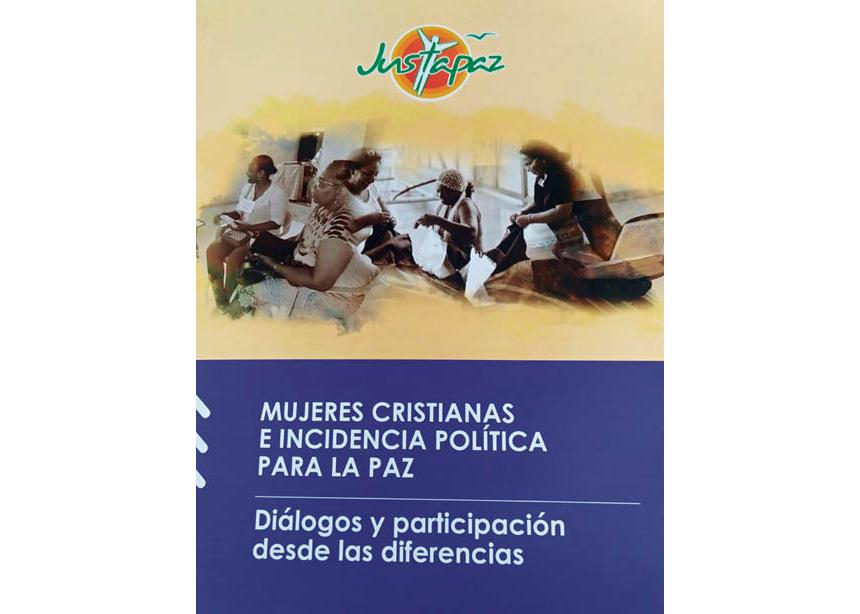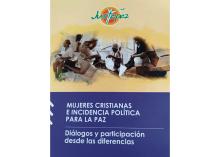The stories of women in the Old Testament serve as an advocacy tool for Colombian women who face paramilitary and gang-related violence in rural communities.
This is the outcome of persistent efforts of Mujer y Paz, a branch of Justapaz, a Mennonite peace and justice organization based in the Colombian capital of Bogotá. The goal of the Mujer y Paz (women and peace) program is to support women as they repair the social fabric of their society.
The program encourages and empowers women to participate in political discourse and spaces where decisions are made. At the same time, it teaches them to protect themselves and their families in this process.
“Many of these women are caged in their homes because it is the safest place that they can be,” says Natalia Parra via video call. She is a trained lawyer who served as a social worker, working with women and young girls, for three years prior to taking on the coordinator role with Mujer y Paz in February 2023.
Mujer y Paz facilitates discussions among women using a workbook called Mujeres Cristianas e Incidencia Política Para la Paz, or Christian Women and Political Impact for Peace.
Through the program, women hold weekly meetings at their local churches. Among other things, they discuss the biblical story of Ruth, who, despite initial protests, travelled to Judah with her loving and loyal mother-in-law, Naomi. Both women are widowed amid famine. Together, they become examples of the good that can come from solidarity among women amid difficult times.
The lives of the women who connect with the peace program have been marked by various forms of violence, including domestic abuse, the loss of a spouse to gang-related or paramilitary violence, or recruitment of their children into paramilitary groups to the benefit of the drug trade. Some of the women have been trafficked and then thrown back into society.
Together with one or two of the other coordinators, Parra travels to places where city services like cellular networks and indoor plumbing become rarities. These places include the departments (states) of Chocó, Caquetá, Narino and Putumayo. The latter two are known as global leaders in cocaine production.
To initiate contact with the women in these communities, Parra and her team have built relationships with local churches.
“Pastors have this misconception that women should not engage in politics,” says Parra. It is a common misconception and particularly strong in the department of Putumayo, she adds. But Parra and her colleagues persist.
For security reasons, Parra cannot name the women who seek support from Mujer y Paz, but she recalls a specific situation in which a woman had endured years of abuse from her husband. As the woman prepared to leave him, she turned to her local pastor for support.
“The pastor told her that separation from her husband went against religion, and that her role was to stay and endure,” recalls Parra.
The woman did as the pastor told her. Time passed, and the woman suffered injuries severe enough that she sought refuge for herself and her children at a nearby clinic.
Sometime later, she became a regular participant in Mujer y Paz workshops. Parra says the woman has since moved on from her marriage and found someone who loves, protects and supports her. They live together in a new community where she serves as a leader, training other women in advocacy.
“She was criticized horribly for having a second husband,” says Parra.
Due to the perspectives of the local pastors, the biblical focus of their workshops provides a critical edge into these communities. A typical weekly meeting may begin with the story of Abigail from 1 Samuel. Abigail’s father married her off to Nabal because of his wealth. Since Nabal was also known to be an alcoholic with a nasty character, it is presumed that she suffered mistreatment in their time together.
After Nabal denies hospitality to the future king David and his men, Abigail learns that David is on his way to make Nabal pay for offending him. She packs food and supplies on a donkey and rides off to meet David before he reaches Nabal. She acknowledges her husband’s error and tells David to let God deal with her husband, thus avoiding a confrontation between Nabal and David. By using her wisdom and persuasion to prevent a bloodbath, she becomes an example of diplomacy.
Parra says this approach to reflecting on biblical stories is generally well-received.
When the biblical portion of the night is through, the stage is set for Parra to take over and introduce some contemporary piece of political information, such as UN Security Council Resolution 1325, which “affirmed the importance of including participation of women and the inclusion of gender perspectives in peace negotiations and humanitarian planning and post-conflict peacebuilding and governance.”
“Recently, pastors have asked to join our workshops because now they’re interested and want to learn,” says Parra. “That was quite the surprise.”
The program also seeks to address environmental injustices. Currently, environmental advocates are at high risk of assassination in Colombia.
In one incident, Mujer y Paz worked with a woman who was attacked while trying to defend El Páramo Santurbán, a mountainous region and rich water source.
Mujer y Paz is one of several programs offered by Justapaz, which was founded in 1990.




Add new comment
Canadian Mennonite invites comments and encourages constructive discussion about our content. Actual full names (first and last) are required. Comments are moderated and may be edited. They will not appear online until approved and will be posted during business hours. Some comments may be reproduced in print.